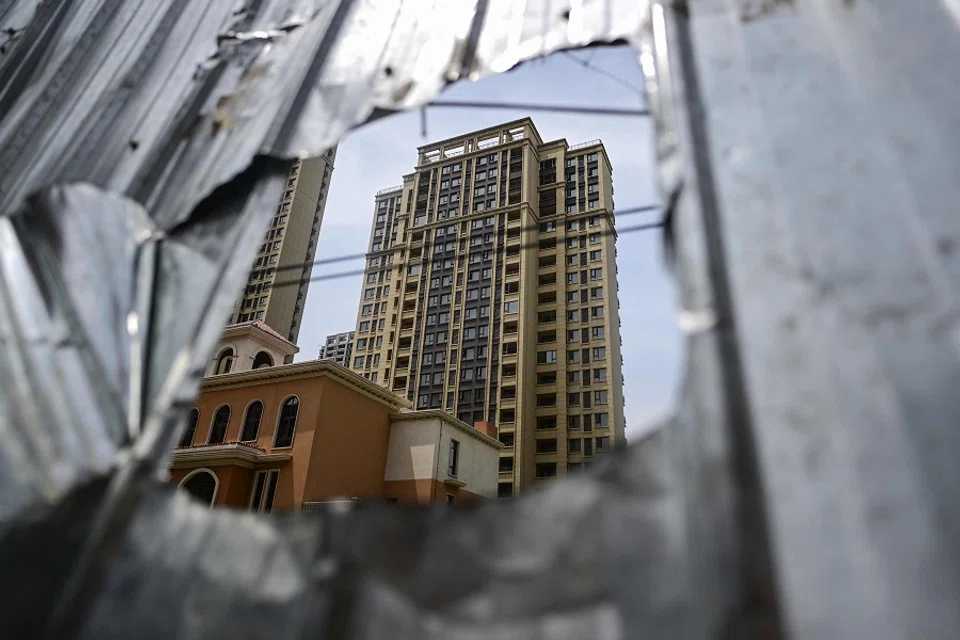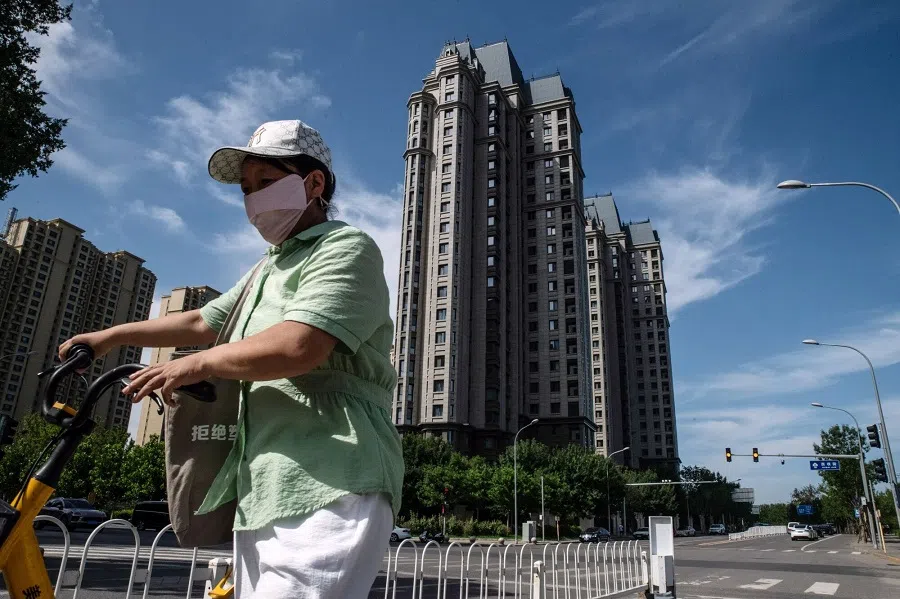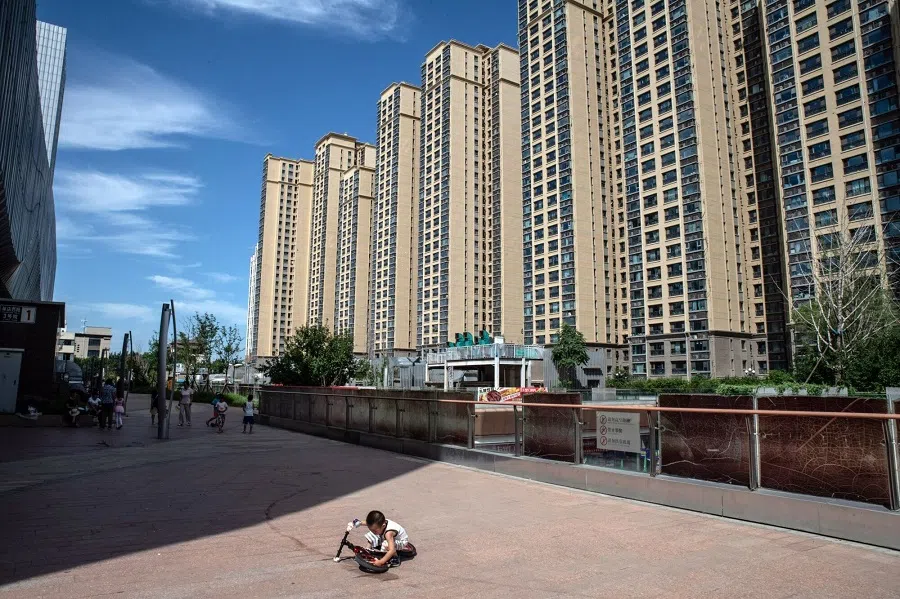Can new policies revive China's home sales?
In a bid to boost home purchases in what has normally been the peak sales period of September and October, Guangzhou and Shenzhen have announced preferential policies for homebuyers. However, Lianhe Zaobao correspondent Chen Jing notes that market confidence is still at a low; are the new policies enough to boost the Chinese property market's recovery?

On 30 August, Guangzhou and Shenzhen announced the easing of mortgage curbs, allowing homebuyers to enjoy preferential loans for first-home purchases regardless of their previous credit record.
Analysts enthusiastically exclaimed on WeChat that the traditional peak season for property consumption and investment in China, the "Golden September and Silver October" period, could revive this year.
Households will be treated as first-home buyers for loans regardless of their mortgage record, as long as they do not now own another home in the city.
Series of policy relaxation
Guangzhou became the first of the four first-tier Chinese cities to ease mortgage curbs, more than a month after the Politburo of the Chinese Communist Party pledged to "adjust and optimise property policies in a timely manner" on 24 July. Households will be treated as first-home buyers for loans regardless of their mortgage record, as long as they do not now own another home in the city. Shenzhen followed suit that same night.
Based on statistics, a dozen first- and second-tier Chinese cities such as Beijing, Shanghai, Chongqing and Xiamen continue to treat buyers with previous mortgages as second-time purchasers. The overly high costs involved in buying a second house have made it incredibly difficult for homebuyers in need of another home to do so. With Guangzhou's and Shenzhen's clear policy signal, the market is hopeful that other major cities will jump on the bandwagon and fully relax home purchase rules.
Apart from easing mortgage curbs, the central ministries and departments also released favourable signals through various measures in the past month, such as the continuation of tax breaks for people who sell their homes and repurchase another within a year. It also announced that the refinancing of listed real estate companies would not be subjected to restrictions even if their stock prices fall below IPO price or net asset value, or if the company is operating at a financial loss.

At the same time, local governments are accelerating the loosening of restrictions on the real estate sector, with Zhejiang's Jiaxing fully abolishing purchase restrictions; Sichuan's Chengdu easing property purchase requirements; and Fujian's Xiamen lowering payment ratios and mortgage rates of second houses.
In addition, various sources indicate that several state-owned banks are preparing to cut interest rates on existing mortgages and deposits as early as this week.
Amid the series of policy relaxations, the market is naturally focused on whether this year's "Golden September and Silver October" period will be able to recreate its past successes.
Confidence test on all fronts
The months of September and October have always been China's peak wedding season, given the apt timing of the long Mid-Autumn Festival and National Day holidays. It is also the country's traditional peak season for home sales, as property developers seize the opportunity to ramp up promotions and attract the surge in potential homebuyers. Yet, over the past two years, the "Golden September and Silver October" period has not only failed to heat up the property market, it has even landed in the deep freeze.
As a result of cooling measures implemented in accordance with the principle that "houses are for living in, not for speculation", as well as the debt crisis facing the country's top developers such as Evergrande, new home prices in China fell for the first time in more than six years in September 2021. A year later, new home prices recorded their biggest drop in more than seven years in October 2022 due to an even more severe liquidity crisis facing property developers and downward pressure on the economy.
An optimistic analysis assessed that these measures will help spur domestic demand for property, while also stabilising overall market expectations and have a guiding effect on the national market.

Indeed, China's housing market has regressed after a brief recovery at the start of the year. However, after the traditional off-peak seasons in July and August, some industry practitioners are optimistic that the previously suppressed housing demand will improve given the current round of policy relaxations and the "Golden September and Silver October" period.
Sources indicate that following Guangzhou's easing of mortgage curbs, property developers have already made preparations to promote property projects for second-home buyers in September. An optimistic analysis assessed that these measures will help spur domestic demand for property, while also stabilising overall market expectations and have a guiding effect on the national market.
Past experience shows that when first-tier cities ease their restrictions, it would usually attract homebuyers who were previously on the sidelines to enter the market, releasing stronger demand for home purchases. This would in turn lead to a market revival in second- and third-tier cities, eventually aiding recovery in the overall property market. The last time the property market rebounded was in 2015 when first-tier cities "opened the floodgates".
However, China's economy, society and demographics have drastically changed since 2015. It remains to be seen if what has worked in the past is still an effective solution. Moreover, the present property market must pass the confidence test on all fronts.
Blow to market confidence
Shenzhen's housing prices have consistently been among the top three in the nation, but a recent listing called for "cut-throat prices", signalling that real estate prices for first-tier cities are no longer as robust.
Country Garden, a titan in the industry, is currently facing difficulties repaying debt as scheduled. Another big player Evergrande resumed trading this week after 17 months only to see their shares plummet by more than 80% in just three days. How far can preferential policy actually help to boost confidence, especially against a market expected to buy only rising shares and avoid falling ones?
... if first-tier cities fully ease restrictions but are still unable to see an impact during the "Golden September Silver October" period, this would be an even bigger blow to confidence in the property market.

At the end of last week, Chinese authorities announced several measures such as reducing the stock trade stamp duty by half, in a bid to stabilise the market. The stock markets in the mainland and Hong Kong experienced a slight uptick for the first two days this week, but fell again on Wednesday (30 August). This indicated that investors still lack confidence in market prospects.
Furthermore, if first-tier cities fully ease restrictions but are still unable to see an impact during the "Golden September Silver October" period, this would be an even bigger blow to confidence in the property market.
Adjustments still needed
Over the long term, the bigger risk to China's property market is the slowing of economic growth and decline in population growth, which in turn portends a fall in the people's demand for housing.
Wang Shi, founder and honorary chair of leading property developer China Vanke Co., opined at a forum last week that the era of quick money and rapid growth in the real estate market is over, and the adjustment cycle is an inevitable reality.
Wang pointed out that the average floor area per capita has increased from 5 square metres in the early days of reform and opening up to 40 square metres. With basic housing issues settled, the growth of real estate development would fall from its peak. Meanwhile, commercial residential housing developed by private developers (商品房) accounts for 80% of China's property market, an unmatched figure globally; thus, the market structure is set to change in the future. "Property developers would have to make significant adjustments," Wang surmised.
The notion that buying a property guarantees against devaluation is no longer mainstream.

From the absence of any mention of "houses are for living in, not for speculation" at Politburo meetings, to property moguls making conservative forecasts, it is clear that the golden era of China's property market has passed. The notion that buying a property guarantees against devaluation is no longer mainstream.
Indeed, one should not harbour hopes that this year's "Golden September and Silver October" period would reap a big harvest; in fact, just stemming further market downturn would already be a huge boon.
This article was first published in Lianhe Zaobao as "中国楼市能否重现"金九银十"?".



![[Big read] When the Arctic opens, what happens to Singapore?](https://cassette.sphdigital.com.sg/image/thinkchina/da65edebca34645c711c55e83e9877109b3c53847ebb1305573974651df1d13a)
![[Video] George Yeo: America’s deep pain — and why China won’t colonise](https://cassette.sphdigital.com.sg/image/thinkchina/15083e45d96c12390bdea6af2daf19fd9fcd875aa44a0f92796f34e3dad561cc)
